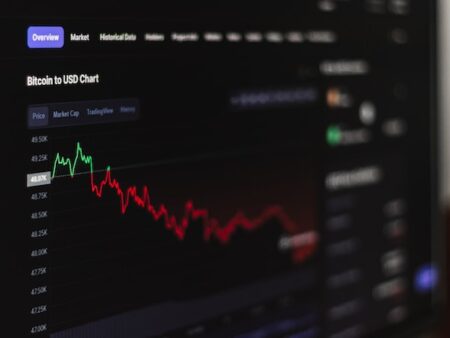When it comes to trading in South Africa, understanding the different types of trading accounts is crucial for success. Each type of account has its own features, benefits, and limitations that should be considered before making a decision. This guide will provide an overview of the various trading account types available in South Africa, and discuss the specific requirements, benefits, and considerations for each.

Key Takeaways:
- There are several different types of trading accounts available in South Africa.
- Choosing the right account type is important for successful trading.
- Individual, joint, corporate, margin, Islamic, and demo trading accounts are all available options.
What is a Trading Account?
In the world of financial markets, a trading account is an essential tool for investors looking to buy or sell a range of securities, including stocks, bonds, and derivatives. A trading account functions as a platform that enables investors to place trades and monitor their investments in real-time.
When an investor opens a trading account with a broker, they deposit funds into it to facilitate their trading activities. They can then use these funds to buy or sell securities on the exchange, with the broker acting as the intermediary.
The type of trading account an investor chooses can impact their trading experience, as each type has its unique trading conditions, fees, and requirements. Therefore, it is essential to understand the different types of trading accounts available in South Africa before opening one.
Different Types of Trading Accounts
South Africa offers a variety of trading account types to suit different needs and preferences. It is essential to understand the features, benefits, and limitations of each type to select the most suitable trading account for successful trading in the financial markets. Here, we discuss the most common trading account types available in South Africa:
| Trading Account Type | Description | Features and Benefits | Limitations |
|---|---|---|---|
| Individual Trading Accounts | This type of account is opened and operated by a single individual. | -Offers complete control over the account’s operations; -Allows for personalized investment strategies; -Easy to set up and maintain. | – Limited access to larger investment opportunities; -Risk of losing all the investment if the market goes south. |
| Joint Trading Accounts | This account is opened and operated by two or more people, such as spouses, friends, or business partners. | -Allows for the sharing of investment costs and risks; -Allows for joint investment strategies; -Offers greater access to larger investment opportunities. | -Requires consensus on investment decisions; -Complicates the tax structure. |
| Corporate Trading Accounts | This account is specifically designed for businesses or organizations. | -Allows for larger investment opportunities; -There is a potential for tax benefits; -Allows for personalized investment strategies. | -Requires additional paperwork and regulations; -May have additional costs. |
| Margin Trading Accounts | This account allows traders to borrow money from a broker to finance their trades. | -Allows traders to invest beyond their current capital; -Provides greater potential for returns. -Allows for short selling. | -Can lead to significant losses; -May require significant collateral. |
| Islamic Trading Accounts | This account follows the principles of Shariah law, which prohibits interest-based transactions and focuses on risk-sharing. | -Compatible with Islamic principles and values; -Allows traders to invest in the financial markets while remaining compliant with Shariah law. | -May have limited investment opportunities; -May have higher fees. |
| Demo Trading Accounts | This type of account allows traders to practice and test their trading strategies without risking real money. | -Allows traders to gain experience and confidence in their trading skills; -Provides a risk-free trading environment. | -Does not involve real money, which can affect trading behaviors and strategies; -May not replicate the real market conditions. |
Each trading account type has its unique features, benefits, and limitations. It is essential to consider individual preferences, trading goals, and risk tolerance while choosing a suitable trading account type. Proper research and analysis can help traders make informed decisions, leading to successful trading outcomes.
Individual Trading Accounts
Individual trading accounts are geared towards investors who wish to trade on their own behalf without the involvement of a third party. These accounts offer maximum flexibility and control over trading decisions, as the investor has full autonomy to buy and sell securities as and when required.
Opening an individual trading account requires the completion of an application form, which typically includes personal and financial information, as well as proof of identity and residence. Some brokers may also require a minimum initial deposit to activate the account.
Individual trading accounts offer a range of benefits, including:
- Flexibility to trade a variety of securities, such as stocks, bonds, and ETFs
- No management or advisory fees, as the investor makes their own investment decisions
- Ability to customize investment strategies to meet specific financial goals and risk tolerance
However, it is important for investors to consider the potential risks associated with individual trading accounts, including:
- Lack of professional advice or guidance, which may increase the risk of making poor investment decisions
- Losses may be incurred due to market volatility or poor timing of trades
- Potential tax implications and fees associated with trading activities
Individual trading accounts are most suitable for experienced investors who have a good understanding of the financial markets and are comfortable with taking on higher levels of risk.
Joint Trading Accounts
Joint trading accounts are similar to individual accounts but are owned by two or more people. These accounts are ideal for spouses, business partners, or friends who wish to pool their resources to trade together.
Joint trading accounts offer several advantages, such as shared responsibility, increased buying power, and potentially more significant returns. However, shared ownership can also lead to complications, such as disputes over trading decisions or unequal contributions to the account.
Evest, an emerging market maker broker, has become a favored choice for many traders, thanks to its expansive offerings and user-friendly features.
Join AvaTrade today and leverage the power of a world-class trading platform. Experience vast asset choices, top-tier tools, and unparalleled security!
Dive into the world of trading with IG – a leader in forex and CFD trading. Experience advanced platforms, vast educational resources, and a global reputation of trust.
Trade seamlessly with CMTrading! Dive into a world of diverse assets with top-notch security protocols and unmatched support.
Considerations for Joint Account Holders
Before opening a joint trading account, it is essential to consider the following factors:
- Trust and Communication: Joint account holders must establish trust and open lines of communication to ensure sound decision-making and prevent conflicts.
- Roles and Responsibilities: Each account holder must define their roles, responsibilities, and contributions to the account to avoid misunderstandings.
- Legal Agreement: A legally binding agreement should be in place that outlines the terms of the joint account, including profit-sharing, decision-making, and account management.
- Exit Strategy: In the event of a breakdown in the relationship or account performance, an exit strategy should be established to avoid financial losses.
It is crucial to choose the right joint account partner and ensure that all parties share the same trading goals, risk tolerance, and financial resources.
“Joint trading accounts can be a powerful tool for achieving financial success, but they require careful planning, clear communication, and mutual trust to be successful.”
Corporate Trading Accounts
Corporate trading accounts are designed for businesses or organizations that engage in trading activities. These accounts have specific requirements and benefits, making them a suitable choice for companies looking to manage their financial assets and generate revenue through trading.
One of the key advantages of a corporate trading account is that it allows businesses to separate their trading activities from their operational funds. This ensures that trading decisions are not influenced by day-to-day business expenses and helps companies manage their financial risks more effectively.
Another benefit of corporate trading accounts is that they offer access to a wider range of financial instruments and trading tools. This can help companies diversify their investment portfolios and take advantage of market opportunities that may not be available through traditional investment channels.
To open a corporate trading account in South Africa, businesses must provide certain documentation, including the company’s registration papers, financial statements, and tax records. Fees may also apply, depending on the brokerage firm and the type of account chosen.
It is important for businesses to carefully evaluate their trading needs and goals before selecting a corporate trading account. Factors to consider include the company’s risk tolerance, trading experience, and financial resources. With the right account in place, businesses can optimize their trading strategies, protect their assets, and achieve their financial objectives.
Margin Trading Accounts in South Africa: Understanding the Risks and Rewards
Margin trading involves borrowing money from a broker to buy assets, such as stocks, in the hope of generating higher returns. Margin trading accounts are a popular option for traders who want to increase their purchasing power and take advantage of market opportunities. However, it also involves significant risks that traders need to understand before opening a margin trading account.
One of the key benefits of a margin trading account is the ability to leverage capital. In other words, traders can invest a larger amount of money than they actually have, potentially boosting their profits. However, this also means that losses can be magnified in the same way.
Traders must maintain a minimum level of equity in their account, called the maintenance margin, to avoid a margin call. A margin call requires traders to deposit additional funds or securities to replenish their account and maintain the required margin level. Failure to meet the margin call can result in the broker selling off assets in the account to cover the deficit, potentially incurring significant losses for the trader.
Margin trading accounts are suitable for experienced traders who understand the risks involved and have a solid trading strategy in place. It is crucial to conduct thorough research on the broker, understand the terms and conditions of the margin trading account, and assess one’s risk tolerance and financial situation before opening one.
Margin Trading Regulations in South Africa
Margin trading is subject to regulations to protect traders from excessive risk and prevent market manipulation. The Financial Sector Conduct Authority (FSCA) regulates all margin trading activities in South Africa, including licensing brokers and monitoring their compliance with regulatory requirements.
Brokers offering margin trading accounts must provide clear and transparent information on their fees, interest rates, margin requirements, and other key features of the account. They are also required to conduct regular risk assessments and implement measures to manage the risks associated with margin trading. Traders should only consider opening a margin trading account with a licensed broker that follows these regulations.
Overall, margin trading accounts can provide opportunities for higher returns, but they also pose significant risks that traders need to be aware of before opening one. It is essential to understand the regulations and requirements for margin trading in South Africa and conduct thorough research before deciding to open such an account.
Islamic Trading Accounts
Islamic trading accounts are a form of trading account that conforms to the principles of Shariah law. Shariah law prohibits the payment or receipt of interest (or riba) which means that conventional trading accounts that charge or pay interest are not suitable for Muslim traders.
Islamic trading accounts provide a solution for Muslim traders who want to engage in trading activities while complying with the principles of Shariah law.
Under Islamic trading accounts, commissions are charged instead of interest, and only trades that comply with Shariah principles are allowed. This means that trades involving certain industries such as alcohol, tobacco, or gambling are prohibited, and leverage is restricted.
Islamic trading accounts are suitable for traders who want to engage in ethical trading practices and adhere to the principles of Shariah law. They are increasingly popular in South Africa and can be opened by both individual and corporate traders.
It is important to note that not all brokers in South Africa offer Islamic trading accounts. It is advisable to do research and select a reputable broker that offers this type of account.
Demo Trading Accounts
Demo trading accounts, also known as virtual or practice accounts, are simulations of real trading accounts that allow traders to practice trading strategies and test out different platforms without risking any real money. This type of account is ideal for beginners, as well as more experienced traders who want to try out new strategies in a risk-free environment.
The benefits of demo trading accounts are numerous, including:
- Providing a learning experience without risking real funds
- Allowing traders to test out different platforms and trading tools
- Providing an opportunity for traders to refine their trading strategies before using real money
- Giving traders a chance to gain confidence and reduce the risk of emotional trading
It is important to note that while demo trading accounts simulate real market conditions, they are not always an exact representation of actual market conditions. The lack of real risk may also affect a trader’s behavior and decision-making, making it important to transition to a real trading account once a trader feels comfortable and confident with their strategy and platform.
Most brokers in South Africa offer demo trading accounts, which can be accessed through their websites or platforms. It’s important to consider any limitations or restrictions on the account, such as time limits or limited access to certain markets or instruments.
Choosing the Right Trading Account
With several trading account types available in South Africa, it’s crucial to select the right one that aligns with your trading goals, experience, and risk tolerance. Below are some of the critical factors to consider when choosing a trading account type:
- Trading Experience: If you are a new trader, it’s advisable to start with a demo trading account, which allows you to practice trading without risking real money. For experienced traders, individual or margin trading accounts may offer better flexibility and potential rewards.
- Trading Goals: Different trading account types suit different trading styles and goals. If you are a long-term investor, individual or joint trading accounts may be suitable. On the other hand, if you are a short-term trader, margin trading accounts may be more appropriate.
- Risk Tolerance: Consider how much risk you are willing to take on. If you want to limit your risk, Islamic trading accounts or individual accounts with stop-loss orders may provide a safer option. However, if you are willing to take on more risk for potentially higher returns, margin trading accounts may be a better choice.
Ultimately, choosing the right trading account type comes down to your personal preferences and needs. Take the time to research and evaluate the various options available and consider seeking advice from a financial professional if necessary.
Account Opening Process and Considerations
Opening a trading account in South Africa requires careful consideration and attention to detail. The process can be complex, and it is important to understand the requirements, fees, and regulatory obligations before proceeding.
Considerations for opening a trading account include:
- Choosing a reputable broker that is licensed by the Financial Sector Conduct Authority (FSCA)
- Determining the account type that is most suitable for your trading goals, risk tolerance, and investment budget
- Providing personal identification and contact information, as well as financial and employment details
- Submitting any required documentation, such as copies of your ID, proof of address, and bank statements
- Reviewing and agreeing to the broker’s terms and conditions, including any fees or commissions that may apply
It is important to note that different brokers may have varying account opening requirements and procedures. Some may offer online account registration, while others may require in-person visits or consultations. It is recommended to research and compare different brokers and their offerings before making a final decision.
Additionally, it is crucial to be aware of the risks involved in trading and to only invest funds that you can afford to lose. It is advisable to have a solid understanding of trading concepts and strategies before opening a trading account.
Conclusion
Choosing the right trading account is crucial for a successful trading experience in the South African market. With various types of trading accounts available, traders need to understand their unique features, benefits, and limitations.
Individual trading accounts are suitable for individual investors, while joint trading accounts are ideal for two or more individuals who want to trade jointly. Corporate trading accounts are designed for businesses or organizations engaging in trading activities. Margin trading accounts are suitable for experienced traders who understand the risks and rewards of margin trading.
For traders who prefer Shariah-compliant trading, Islamic trading accounts are an ideal choice. Demo trading accounts provide a risk-free environment to practice and test trading strategies before committing any funds.
When choosing a trading account, traders should consider their preferences, trading goals, and risk tolerance. The account opening process involves documentation, fees, and regulatory requirements that traders need to take into account.
Choose Wisely and Trade Confidently
By understanding the different trading account types and selecting the most suitable one, traders can maximize their trading potential and achieve their financial goals. It is essential to choose wisely, as the right trading account can help traders trade confidently and efficiently.
Whether you are an individual investor, business owner, or experienced trader, we hope this guide has provided valuable insights into trading account types in South Africa. The key to successful trading is to stay informed, be mindful of risks, and always trade responsibly.
FAQ
Q: What is a trading account?
A: A trading account is a type of financial account that allows individuals or entities to buy, sell, and hold various financial instruments, such as stocks, bonds, commodities, and currencies, in the financial markets.
Q: What are the different types of trading accounts?
A: There are several types of trading accounts available in South Africa, including individual trading accounts, joint trading accounts, corporate trading accounts, margin trading accounts, Islamic trading accounts, and demo trading accounts.
Q: What is an individual trading account?
A: An individual trading account is a personal account that is opened and operated by an individual investor. It allows individuals to trade and invest in the financial markets using their own funds and making their own investment decisions.
Q: What is a joint trading account?
A: A joint trading account is a shared account that is opened and operated by two or more individuals. It allows multiple account holders to pool their funds and make joint investment decisions in the financial markets.
Q: What is a corporate trading account?
A: A corporate trading account is an account that is opened and operated by a business or organization. It is designed for companies or entities that engage in trading activities and allows them to trade and invest in the financial markets using their corporate funds.
Q: What is a margin trading account?
A: A margin trading account is an account that allows traders to borrow funds from a broker to trade financial instruments. It allows traders to leverage their investments and potentially magnify their returns, but it also increases the risk of losses.
Q: What is an Islamic trading account?
A: An Islamic trading account, also known as a Shariah-compliant trading account, is an account that adheres to the principles of Islamic finance. It is designed for individuals who want to engage in trading activities while complying with Islamic law, which prohibits certain financial activities, such as charging or paying interest.
Q: What is a demo trading account?
A: A demo trading account is a virtual trading account that allows individuals to practice trading and test their trading strategies without using real money. It provides a risk-free environment for traders to gain experience and confidence before trading with real funds.
Q: How do I choose the right trading account?
A: Choosing the right trading account depends on your individual preferences, trading goals, and risk tolerance. Consider factors such as account requirements, fees, available financial instruments, trading platforms, and customer support when selecting the most suitable trading account type.
Q: What is the process for opening a trading account in South Africa?
A: The process for opening a trading account in South Africa typically involves completing an application form, providing the required documentation, such as proof of identity and address, and complying with the regulatory requirements set by the financial authorities. It is important to carefully review and understand the account opening process and any associated fees or considerations before proceeding.






